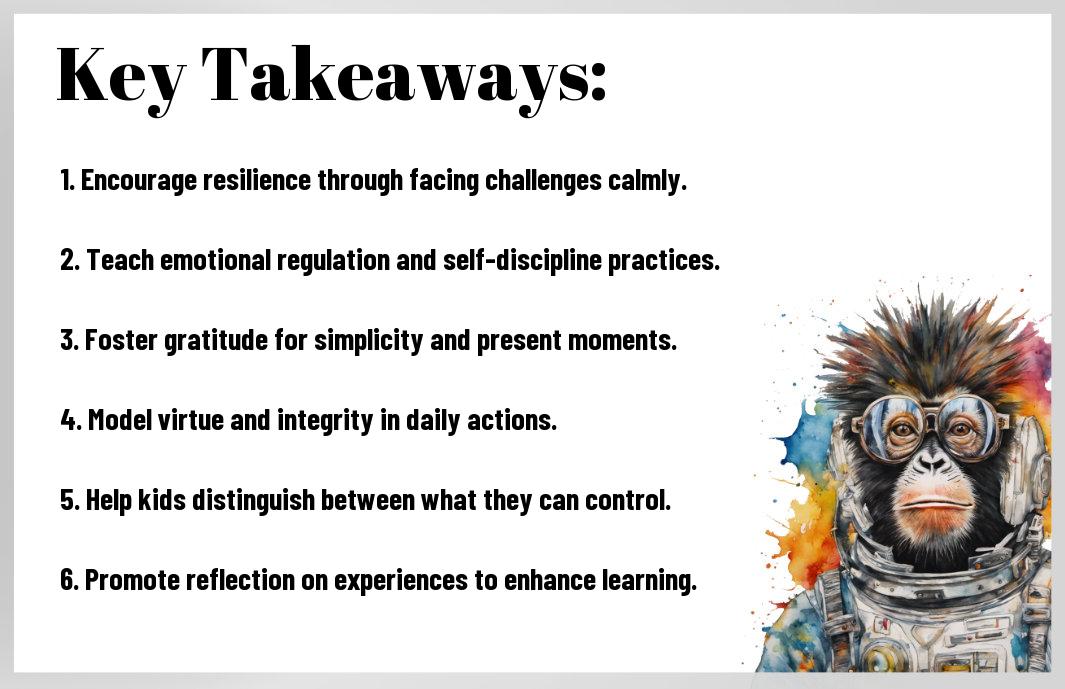With the complexities of parenting today, I often find myself seeking guidance that helps nurture resilience and self-control in my children. Introducing Stoic principles can provide valuable tools for teaching kids how to handle challenges with grace and composure. In this blog post, I will share practical ways you can incorporate Stoic wisdom into your parenting approach, empowering your kids to develop a strong mindset and navigate life’s ups and downs with confidence and clarity. Let’s explore how together!
Key Takeaways:
- Emotional resilience: Teaching kids to face challenges with a calm mind helps them develop strong emotional resilience.
- Acceptance of obstacles: Encouraging children to accept obstacles as part of life prepares them for real-world challenges.
- Control over reactions: Highlighting the importance of controlling reactions empowers kids to respond thoughtfully rather than impulsively.
- Value of virtues: Instilling virtues such as wisdom, courage, and justice guides children in making ethical decisions.
- Mindfulness practices: Incorporating mindfulness techniques promotes awareness and helps kids stay grounded during stressful situations.
- Fostering gratitude: Encouraging gratitude cultivates a positive mindset, allowing children to appreciate what they have.
- Role modeling: Demonstrating stoic principles in everyday life offers a practical example for children to emulate.

Understanding Stoicism
What is Stoicism?
Your journey into understanding Stoicism begins with its essence. To put it simply, Stoicism is an ancient philosophy that teaches the development of self-control and fortitude as a means to overcome destructive emotions. It emphasizes rationality, personal virtue, and wisdom, guiding individuals to focus on what they can control while accepting what they cannot. As I explore into this philosophy, I find it profoundly relevant in today’s fast-paced world, providing clarity and direction in the chaos of daily life.
Key Stoic Principles for Parenting
Before we dive deeper into how Stoicism can shape our parenting, it’s important to recognize some of the principles that guide this philosophy. Stoicism encourages us to focus on our responses rather than external events, to embrace the idea of acceptance, and to prioritize virtue over material success. These principles challenge us to be mindful of the values we instill in our children, promoting resilience and emotional intelligence in their everyday lives.
Principles such as practicing gratitude, maintaining perspective, and fostering emotional resilience can significantly enrich our parenting experience. By modeling these Stoic values, I can teach my children how to navigate life’s ups and downs with grace and understanding. For instance, when faced with setbacks, I guide them to see challenges as opportunities for growth rather than obstacles. This approach not only strengthens their character but also builds a solid foundation for them to thrive in an unpredictable world. As I integrate Stoicism into my parenting, I witness not only my growth but also my children’s ability to face life’s challenges with courage and wisdom.

Building Resilience in Children
Assuming we want to raise kids who can navigate life’s ups and downs with grace and strength, incorporating Stoic wisdom into their upbringing is a fantastic way to do just that. By instilling resilience, we help them face challenges head-on and cultivate a mindset that views difficulties as opportunities for growth. It’s not just about bouncing back; it’s about bouncing forward, learning, and becoming stronger as a result of what life throws at them.
The Power of Adversity
An important lesson from Stoicism is that adversity can be a powerful teacher. When we expose our children to small, manageable challenges, we’re giving them the chance to learn how to deal with discomfort and uncertainty. Whether it’s handling a disappointment in school or overcoming a fear of trying something new, these experiences foster growth and independence. I encourage you to create an environment where your child understands that obstacles aren’t insurmountable; rather, they can be stepping stones to greater resilience and confidence.
Teaching Emotional Regulation
At times, our children may experience emotions that seem overwhelming. That’s where teaching emotional regulation comes into play. By helping your child identify and manage their feelings, you provide them with tools to navigate their inner world. By applying Stoic principles, we can show them that feelings are natural but they don’t have to dictate their reactions or decisions. It’s about encouraging them to pause and reflect, granting them the power to choose how to respond to their emotions.
For instance, engaging in activities like journaling or breathing exercises can help your child articulate what they feel, rather than letting those emotions spiral out of control. When you encourage them to express their thoughts and feelings in a safe space, it reinforces that it’s okay to experience a wide range of emotions. This process supports their ability to remain calm and centered, even in trying moments, which is an imperative component of resilience. Together, we can build a foundation of understanding and security for our children, empowering them to face life’s challenges with confidence.
Encouraging Gratitude and Mindfulness
Once again, instilling a sense of gratitude and mindfulness in our kids can be transformative for their emotional well-being. Teaching them to appreciate the little things and to remain present in the moment can help develop resilience and foster a positive outlook towards life. As parents, I know how rewarding it can be to see our children find joy and contentment in their daily experiences. By encouraging gratitude and mindfulness, we can give our kids valuable tools to navigate life’s challenges gracefully.
Daily Practices for Gratitude
After integrating gratitude into our daily routine, I found that it significantly uplifted the atmosphere in my home. A simple practice I adopted is keeping a gratitude journal where we jot down things we are grateful for each day. This habit not only helps my kids express their appreciation but also encourages them to focus on the positives rather than dwelling on the negatives. Additionally, sharing our grateful thoughts at dinner fosters a bonding experience and serves as a reminder of the abundance in our lives.
Mindfulness Techniques for Kids
Encouraging mindfulness in my children has become a cherished practice in our daily life. Simple techniques such as deep breathing exercises or mindful coloring sessions not only capture their attention but also ground them in the present moment. I often invite my kids to take a few moments before bedtime to reflect on their day, focusing on their feelings and experiences to promote emotional intelligence. Playing mindful games, like “I Spy” or sensory walks, has also proven effective in making them more aware of their surroundings, ultimately helping them cultivate a sense of wonder and appreciation for the world.
Another activity I’ve found beneficial is practicing “mindful listening.” I encourage my kids to close their eyes and listen intently to the sounds around them, whether it’s the rustling of leaves or distant laughter. After a minute or so, we discuss what they heard. This exercise not only enhances their listening skills but also helps them develop an appreciation for the present moment, making them more mindful and connected to their experiences. Each small step contributes positively to their emotional toolkit, empowering them to handle life with a bit more poise and composure.
Fostering Independent Thinking
To raise children who think for themselves, I believe it’s important to create an environment that encourages independent thought. This means giving them the tools and opportunities to think critically about the world around them. I strive to nurture their curiosity, ensuring they feel comfortable exploring their ideas and challenging the status quo. By promoting independent thinking, you empower your kids to develop their own opinions, fostering a sense of confidence that they can carry with them throughout their lives.
Encouraging Questions and Exploration
Above all, I find that encouraging questions and exploration is important in promoting independent thinking. I always welcome my kids’ inquiries, no matter how simple or complex. By engaging in open conversations, I help them feel validated in their quest for knowledge. I also support their exploratory nature by providing access to various resources—books, art supplies, or even nature walks—where they can simmer in their thoughts or engage in hands-on learning.
Allowing Natural Consequences
Between providing guidance and allowing them to learn from their experiences, I often lean towards the latter. When I let my kids face natural consequences, it gives them the opportunity to reflect on their choices and understand the ramifications. This isn’t about watching them fail; rather, it’s about fostering resilience and growth in the face of challenges. I trust that by experiencing the outcomes of their decisions, they’ll hone their problem-solving skills and develop a sense of responsibility for their actions.
This approach can sometimes be uncomfortable, but I find it necessary for their development. Allowing natural consequences means standing back when they forget their homework or choose to play instead of studying. It’s not always easy to watch them make mistakes, but these moments become invaluable lessons. They learn to analyze what went wrong and think critically about how to improve in the future, allowing for their independence to thrive in a supportive yet structured framework.

Cultivating Empathy and Compassion
Unlike the often individualistic mindset that permeates our culture, raising kids with a focus on empathy and compassion can lead to a more harmonious community. Teaching your children to understand and care for others fosters not only strong relationships but also emotional resilience. When children learn to consider others’ feelings and experiences, they become more equipped to navigate the complexities of social interactions, making them kinder and more supportive individuals. To instill these values, I try to model them in my own behavior and encourage open discussions about emotions and the well-being of others in our family, creating a nurturing environment where compassion thrives.
Teaching Emotional Intelligence
At the heart of cultivating empathy is teaching emotional intelligence. I emphasize the importance of recognizing one’s own emotions and understanding those of others. By engaging in conversations about feelings, using role-play to simulate various scenarios, and encouraging children to express their emotions freely, I can help them develop a language for their feelings. This understanding not only enhances their ability to connect with others but also allows them to articulate their own needs and emotions more effectively.
The Importance of Perspective
Intelligence in recognizing different perspectives is a vital part of nurturing compassion. I find it important to encourage my children to step into someone else’s shoes, to see the world through their eyes, and to understand their experiences. This practice not only broadens their understanding of other people’s lives but also fosters a sense of interconnectedness and respect for diversity. By discussing real-life situations, both positive and negative, I help my kids grasp how varied circumstances and backgrounds can shape individuals differently.
Plus, by teaching perspective-taking, I empower my children with the ability to look beyond their immediate needs or feelings. This skill helps them become more compassionate problem-solvers who consider the broader implications of their actions on others. When they learn to regard different viewpoints respectfully, they cultivate a deeper understanding of relationships, further enhancing their emotional intelligence and compassion towards the people around them.
Daily Stoic Practices for Families
After exploring the core principles of Stoicism, I’ve realized that incorporating these timeless teachings into daily family life can deeply enrich our relationships and help us cultivate resilience. One effective way to do this is by discussing Stoic lessons at the dinner table or during family meetings. You might share stories about famous Stoics like Marcus Aurelius or Epictetus, and then encourage your children to connect those lessons to their own experiences. This not only deepens their understanding but also plants the seeds of philosophical thinking in their minds, giving them tools to navigate life’s challenges with grace and bravery.
Incorporating Stoic Lessons into Family Life
Incorporating Stoic lessons into family life is a wonderful way to reinforce the values of wisdom and emotional strength within our homes. For example, I find it helpful to guide my children through moments of frustration or disappointment by reminding them about the importance of focusing on what they can control. Together, we can practice gratitude by noting things we appreciate each day, which helps shift our perspectives from what we lack to the abundance we already enjoy. These practices create a sense of unity, encouraging open dialogue and emotional growth.
Creating a Stoic Family Tradition
Behind the idea of creating a Stoic family tradition is the belief that such rituals can ground us in principles that matter most. You could designate a Stoic night each week where the family gathers to reflect on the week’s challenges and triumphs, sharing insights on how Stoicism can guide our responses. Perhaps you might read a passage from a Stoic text and discuss how it applies to your lives. These kinds of traditions not only enhance your family bond but also instill a sense of calm and purpose in an otherwise chaotic world.
Life offers countless opportunities to foster a Stoic family tradition. This could be something as simple as a Saturday morning reading session where each family member picks a Stoic quote to reflect on, or creating a “Stoic jar” where everyone can contribute notes of wisdom or lessons learned throughout the week. Whatever practice you decide to incorporate, it’s about building consistency and allowing these Stoic principles to seep into your family culture, ensuring that your children carry these values with them as they grow. Teaming up with my family in this way has not only deepened our connections but has also placed resilience and equanimity at the forefront of our everyday lives.
Final Words
Summing up, I believe that raising kids with Stoic wisdom can be a transformative experience for both you and your children. By teaching them the values of resilience, patience, and understanding their emotions, you’re equipping them with tools that will serve them throughout their lives. This journey is not always easy, but the rewards are beautifully enriching. When I found myself challenged by the everyday chaos of parenting, embracing Stoic principles reminded me of the importance of focusing on what I can control, thereby creating a calmer environment for my kids to thrive in.
If you’re interested in discovering more about how to raise children according to the stoic philosophy, I encourage you to explore additional resources. Engaging with a community can provide you with insights, advice, and shared experiences. A great place to start is this thread on Reddit, which dives into various approaches and thoughts about Raising children according to the stoic philosophy. Together, we can nurture a new generation of resilient, compassionate, and wise individuals who face life’s challenges head-on with grace. Happy parenting!
FAQ
Q: What is Stoicism and how can it help in raising kids?
A: Stoicism is a philosophy that emphasizes resilience, virtue, and wisdom. By incorporating Stoic principles into parenting, caregivers can foster emotional strength, adaptability, and rational thinking in their children. This approach encourages kids to focus on what they can control, develop a sense of gratitude, and build healthy coping mechanisms for facing challenges.
Q: At what age can I start teaching Stoic principles to my children?
A: Children can begin to understand and benefit from Stoic ideas from a young age, typically around six or seven. Simple concepts such as gratitude, the importance of effort over outcome, and the distinction between what they can and cannot control can be introduced through stories, discussions, and everyday situations. As they grow older, more complex ideas can be gradually introduced.
Q: How can I incorporate Stoicism into daily parenting practices?
A: Parents can incorporate Stoicism by modeling Stoic behavior, discussing Stoic concepts during everyday situations, creating a Stoic-themed family activity, or reading Stoic literature together. Encouraging reflection on daily experiences, promoting emotional regulation, and fostering a growth mindset are effective ways to weave Stoicism into daily routines.
Q: What are some practical activities to teach Stoic concepts to kids?
A: Practical activities can include journaling about daily experiences and feelings, discussing a Stoic quote, practicing mindfulness, and engaging in role-playing scenarios where children must make choices based on Stoic values. Craft projects such as creating a gratitude jar can also be a fun and engaging way to reinforce Stoic teachings.
Q: How can Stoic teachings help my child deal with failure or disappointment?
A: Stoicism teaches that failure and disappointment are part of life and through resilience, we can learn from these experiences. Encouraging children to view setbacks as opportunities for growth and to reflect on what they can control helps build a healthier mindset. This teaches them to respond to challenges with patience, humility, and determination.
Q: Is it important to combine Stoicism with other parenting philosophies?
A: Yes, combining Stoicism with other philosophies can create a more holistic approach to parenting. While Stoic teachings focus on emotional resilience and rational thinking, integrating aspects of compassion, empathy, and open communication can help to develop well-rounded individuals. This balanced approach can cater to the emotional and intellectual development of children.
Q: Can Stoicism help in managing my own stress as a parent?
A: Absolutely! Applying Stoic principles can greatly assist parents in managing stress. By focusing on what can be controlled—such as responses and actions—while letting go of uncontrollable aspects, parents can cultivate a more composed mindset. Mindfulness practices and reflection on personal values aligned with Stoicism can empower parents to navigate parenting challenges with greater ease.



